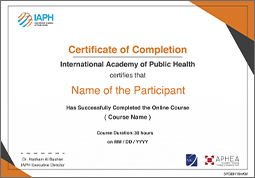Environmental Health Management
Environmental health is a branch of public health that studies factors in the environment that affect human health and how those factors could be identified, prevented, assessed, and controlled. Those environmental factors could be physical, biological, social, and even psychological as well as pollutants or toxicants. Environmental exposures might be present in the air, water, or food, which can enter the human body through inhalation, ingestion, or absorption and may deter human health. This interdisciplinary program will introduce residents to public health issues associated with exposure to anthropogenic and naturally occurring chemical, microbial, and biological contaminants in air, water, soil, and food. Graduates will become professionals who work to identify, assess, and evaluate contaminants and their detrimental effects on human health. Environmental program graduates will be able to promote a healthier environment, intensify primary prevention, and influence public policies in all sectors to address the root causes of environmental and social threats to health.
Learning Outcomes
- Identify major foodborne illnesses and their potential sources
- Explain the steps to assess, control and prevent foodborne illnesses
- Identify the potential contaminants in water and explain how they are tested for
- Illustrate the major drinking water treatment processes
- Describe major causes of air pollution, their sources, health effects, and assessment
- Draw appropriate inferences from epidemiologic data related to environmental hazards
Field Work
Residents spend seven weeks in the field work in order to be exposed to real-life situations and to practice the skills they gain with the guidance of a dedicated mentor. The following field projects are expected to be conducted during the field work period:
- Apply latest techniques for heavy metal assessment, microbial analyses, air sampling, and chemical identification.
- Appropriately use the knowledge for critiquing major environmental health issues.
- Conduct common interventions during environmental health
- Propose solutions for a local environmental issue
Targeted Group
The programs are targeting professionals working for ministries of health, non-governmental organizations, and humanitarian agencies. they are also valuable for those looking for a career in environmental and occupational health.


Certificate





